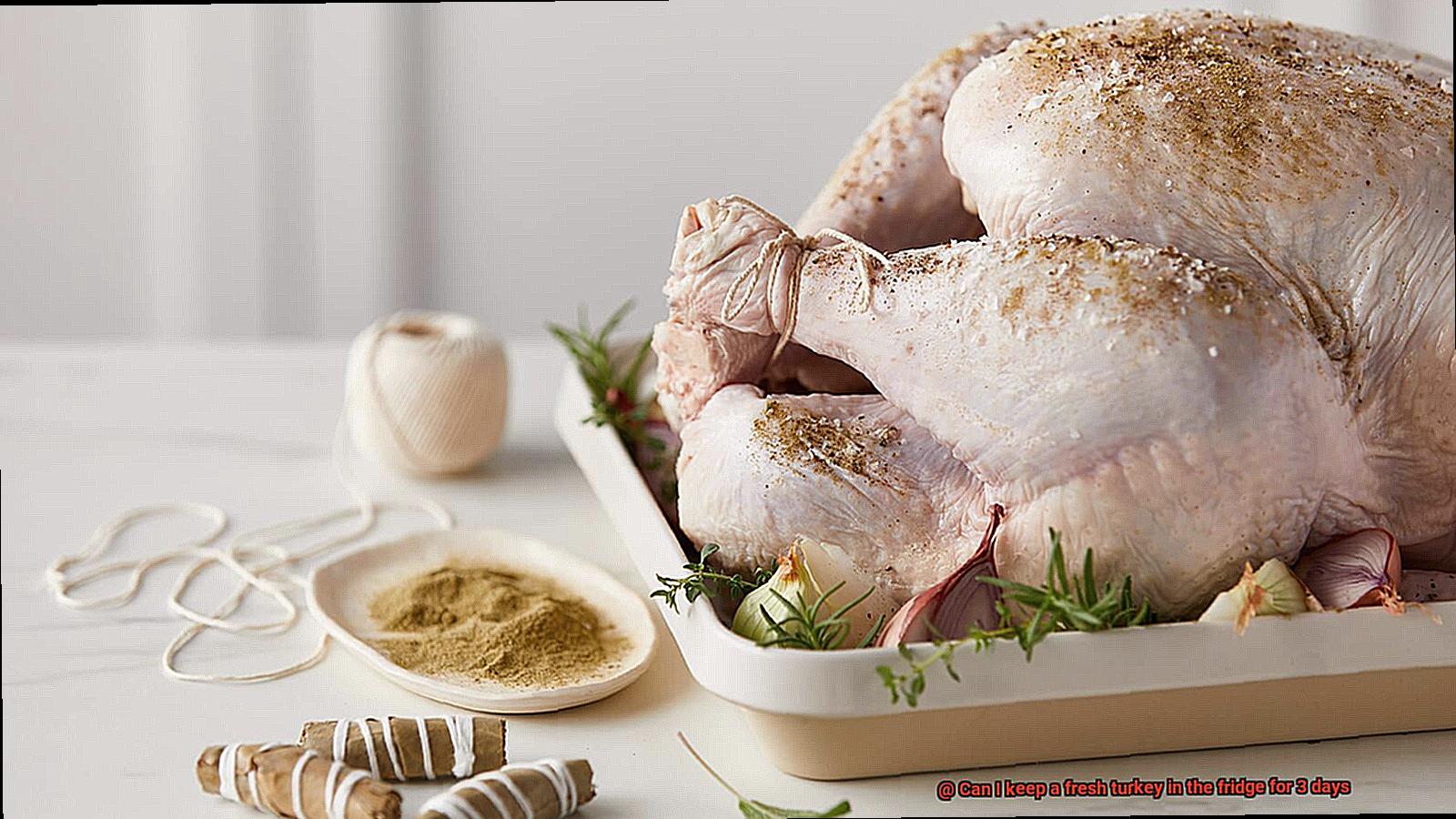Are you ready to impress your guests with a succulent turkey this holiday season? Or maybe you’re just a fan of the bird and want to add it to your meal rotation. Either way, you might be wondering how long a fresh turkey can last in the fridge. Don’t worry, I’ve got you covered.
When it comes to raw poultry, proper handling is essential to avoid getting sick. So let’s get one thing straight: a fresh whole turkey should only be stored in the fridge at or below 40°F (4°C) for one to two days before cooking. After that, bacteria can start multiplying rapidly and cause food poisoning.
But what if you’re not planning on cooking the turkey right away? Can it still hang out in the fridge for a few days? The answer is yes, but don’t push it past three days before cooking. It’s always better to err on the side of caution and cook it sooner rather than later.
In this post, we’ll dive into the nitty-gritty of storing a fresh turkey in the fridge, discuss why keeping it for too long is risky business, and provide tips to ensure your bird stays safe and scrumptious. So grab a cup of coffee (or tea), sit back, and let’s talk turkey.
Contents
The Basics of Refrigerating a Fresh Turkey
Proper refrigeration is key to keeping it safe and delicious. Here are some basic guidelines to help you out.

Firstly, purchase your turkey as close to the day you plan to cook it as possible. This ensures that it stays fresh and doesn’t spoil before you’re ready to cook it. Once you have your turkey, store it immediately in the refrigerator at a temperature between 33°F and 40°F.
To prevent cross-contamination, place your turkey in a shallow container or on a tray. This also catches any drips and keeps it separate from other foods in the fridge. It’s important to regularly check the temperature of your fridge to ensure it stays at the right range.
While fresh turkeys are recommended to be stored for no more than two days, it’s best to purchase one that hasn’t been previously frozen. A previously frozen turkey may already have been stored for an extended period of time before being thawed, increasing the risk of bacterial growth. If you need to store your turkey for three days, ensure that its size is taken into consideration. A larger bird will take longer to cool down in the fridge, so allow enough time for it to reach a safe temperature before storing it.
Checking your turkey regularly while it’s in the fridge is crucial. Keep an eye out for any signs of spoilage such as an unusual odor or discoloration. If you notice anything suspicious, discard your turkey immediately.

Is It Safe to Keep a Fresh Turkey in the Fridge for Three Days?
With Thanksgiving just around the corner, you may be wondering if it’s safe to store a fresh turkey in the fridge for three days. The answer is a bit complicated, as it depends on certain factors. But fear not, as I’m here to provide you with expert information on this topic.
Let’s start with the basics. It’s important to note that a fresh turkey can only be stored safely in the fridge for up to two days. After that, there’s a risk of bacterial growth that can result in foodborne illnesses. In other words, if you plan on keeping your turkey for three days or more, it’s recommended that you freeze it instead.
However, if you’re set on refrigerating your turkey for three days, there are steps you can take to minimize the risk of bacterial growth. Here are some crucial considerations:

- Temperature control: Ensure that your fridge is set at 40°F or below. This will keep your turkey cool enough to prevent bacteria from growing.
- Proper storage: Wrap your turkey tightly in plastic wrap or aluminum foil and place it on a tray or plate to catch any juices that may leak out. This prevents cross-contamination and reduces the risk of bacterial growth.
- Avoid overcrowding: An overcrowded fridge can lead to uneven cooling and increase the chances of bacterial growth. Therefore, make sure there’s enough space around your turkey.
By following these precautions, you can keep your fresh turkey safe and tasty for up to three days in the fridge. However, if you’re unsure about storing it correctly or have concerns about its safety, it’s best to freeze it instead.
What Precautions Should Be Taken When Storing a Fresh Turkey for Three Days?
While this is possible, there are some essential precautions that you need to take to ensure the safety and quality of the meat.
Firstly, maintaining a temperature of 40°F or below is crucial. Bacteria can grow rapidly at temperatures between 40°F and 140°F, which is known as the danger zone. You can achieve this temperature by keeping your turkey in the coldest part of your fridge, like the back or bottom. If there’s not enough space, place the turkey in a cooler with ice packs or frozen gel packs.
Covering your turkey properly is another vital precaution to prevent cross-contamination with other foods in the fridge. You can use a plastic bag or wrap it tightly with aluminum foil or plastic wrap. Ensure that no part of the turkey is exposed to air.

If you plan on stuffing your turkey, remove the stuffing before storing it in the fridge. Stuffing provides a breeding ground for bacteria, increasing the risk of foodborne illness. Instead, store your stuffing separately in an airtight container in the fridge.
Before storing your turkey, ensure it is fresh by checking for any signs of discoloration, unpleasant odors, or slimy texture. If you notice any of these signs, discard your turkey instead of storing it.
To summarize, here are some precautions you should take when storing a fresh turkey for three days:
- Keep your turkey at a temperature of 40°F or below.
- Store your turkey in the coldest part of the fridge.
- Cover your turkey properly to prevent cross-contamination.
- Remove stuffing before storing.
- Check for freshness before storing.
Purchasing A Fresh Turkey vs. A Previously Frozen One
As the holiday season approaches, the age-old debate between purchasing a fresh turkey or a previously frozen one comes to the forefront. While both options are available, there are some key differences to consider before making your decision.
Let’s start with fresh turkeys. They tend to be pricier than their frozen counterparts, but they offer some distinct advantages. Fresh turkeys are known for being juicier and more flavorful, and since they haven’t been frozen, they don’t require any thawing time before cooking. This saves you precious time and hassle in the kitchen.
However, fresh turkeys do have a shorter shelf life compared to frozen ones, which means you need to cook them within a few days of purchase. This requires some careful planning, and it’s crucial to ensure that everything else is ready before picking up your bird. But if you’re willing to put in the extra effort, a fresh turkey is definitely worth considering for its superior taste and texture.
Alternatively, frozen turkeys offer convenience and affordability. They are more widely available and less expensive than fresh ones, making them a popular choice for many households. Plus, they have a longer shelf life and can be stored in the freezer for months, allowing you to plan ahead and cross one thing off your to-do list.
However, there is one major drawback – frozen turkeys need to be thawed before cooking. Depending on the size of your bird, this can take several days and requires careful planning to ensure it’s fully defrosted before cooking. Failure to do so could result in an undercooked bird, causing stress and disappointment at the dinner table.
So which option should you choose? It ultimately depends on your personal preferences and needs. If you prioritize convenience and cost-effectiveness, a frozen turkey may be the way to go. But if you’re willing to spend a little extra money for a tastier bird and are up for the challenge of cooking it within a few days, a fresh turkey is definitely worth considering.
The Size of the Turkey Matters
Well, before you start planning your menu, let’s talk about the importance of the size of your turkey and how it affects its storage in the fridge.
First things first, let’s establish that keeping your turkey in the fridge is the safest way to store it before cooking. According to the USDA, a whole turkey should be kept in the fridge at a temperature of 40°F or below and cooked within four days of purchase. However, the size of your turkey plays a crucial role in determining how long it can safely stay in the fridge.
If you have a smaller turkey weighing around 10-12 pounds, it is safe to keep it in the fridge for up to three days before cooking. But if you have a larger bird weighing over 20 pounds, it is recommended to only keep it in the fridge for up to two days before cooking. This is because larger turkeys take longer to cool down to a safe temperature in the fridge, and if left too long, they can harbor bacteria and become unsafe for consumption.
If you plan on brining your turkey (which I highly recommend for added flavor and juiciness), you need to factor in additional time for storage. A brined turkey needs to be kept in the fridge for an extra 12-24 hours before cooking. So if you’re planning on brining a large turkey, make sure to purchase it closer to the day you plan on cooking it.
Now that we’ve covered storage times based on weight and brining considerations, let’s talk about proper storage methods. To ensure that your turkey stays fresh and safe for consumption, keep it in its original packaging or wrap it tightly in plastic wrap or aluminum foil to prevent any air from getting in and drying out the meat. Place it on a tray or pan to catch any juices that may leak out.
Cooling Down the Turkey Before Refrigeration
Before you start cooking, it’s crucial to know how to store your fresh turkey in the fridge properly. Otherwise, you could be risking food spoilage and bacterial growth that could lead to foodborne illnesses.
As an expert in this area, I’m here to guide you on how to cool down your fresh turkey before refrigeration. Follow these simple and easy steps to ensure your turkey stays fresh and safe for consumption.
Firstly, remove the turkey from its packaging and rinse it under cold water. This step helps to remove any excess juices or bacteria that could be lingering on the surface of the bird. Next, pat the turkey dry with paper towels and place it on a clean cutting board. This gives you a chance to inspect the bird for any remaining feathers or unwanted debris.
Now it’s time to cool down the turkey. Fill a large container with ice and cold water. Submerge the turkey completely, making sure that even the cavity is filled with ice water. Let the turkey sit in the ice bath for approximately 30 minutes or until its temperature has dropped to around 40°F. Cooling down your turkey before refrigeration is essential because if it’s still warm when placed in the fridge, it can cause the internal temperature of the fridge to rise, potentially causing other foods in the fridge to spoil.
Once your turkey has cooled down properly, remove it from the ice bath and pat it dry with paper towels. Now you can place the bird into a clean container or onto a clean plate and cover it with plastic wrap or aluminum foil before placing it into the refrigerator. Remember that a fresh turkey can be stored in the fridge for up to three days before cooking. Beyond three days, there is a risk of bacteria growth, which can cause food poisoning.
Storing the Turkey in the Fridge Properly
Firstly, let’s talk about temperature. It’s crucial that your fridge is set below 40°F (4°C) to prevent harmful bacteria growth. This will ensure that your turkey stays safe and fresh for consumption.
Next, wrap or cover your turkey properly to prevent any contamination or exposure to air. You can use airtight plastic wrap or a large plastic bag for this purpose. But don’t forget to place the turkey on a tray or in a container to catch any juices that may leak during storage.
Planning ahead is key when it comes to storing a fresh turkey in the fridge. Be sure to allow enough time for proper thawing by allowing 24 hours of thawing time for every 4-5 pounds of turkey. So, if you have a 12-pound turkey, you’ll need at least 3 days for it to fully thaw in the fridge before cooking.
Once the turkey has been thawed in the fridge, it should be cooked within 1-2 days. And if there are leftovers, make sure to store them properly. Place them in an airtight container and consume them within 3-4 days.

To sum it up, here are some simple steps to follow when storing your fresh turkey in the fridge:
- Set your fridge temperature below 40°F (4°C).
- Wrap or cover your turkey properly.
- Place the turkey on a tray or in a container to catch any juices.
- Allow enough time for proper thawing.
- Cook the turkey within 1-2 days after thawing.
- Store leftovers properly and consume them within 3-4 days.
Yhw2JJUweYY” >
Conclusion
In conclusion, the key to a delicious and safe fresh turkey is proper handling and storage. It’s crucial to remember that a fresh whole turkey should only be stored in the fridge at or below 40°F (4°C) for one to two days before cooking, as bacteria can quickly multiply after that point. However, if you need more time before cooking, your turkey can remain in the fridge for up to three days.
To ensure your fresh turkey stays fresh, wrap or cover it correctly to prevent contamination and exposure to air. Place it on a tray or container to catch any juices that may leak during storage and allow ample time for proper thawing. After thawing, cook the turkey within 1-2 days and store leftovers properly, consuming them within 3-4 days.
When choosing between a fresh or previously frozen turkey, consider taste preference and convenience. For larger birds or brining your turkey, take extra precautions such as cooling it down before refrigeration and factoring in additional time for storage.
By following these guidelines and precautions, you’ll create an impressive holiday meal that’s both succulent and safe-to-eat.






